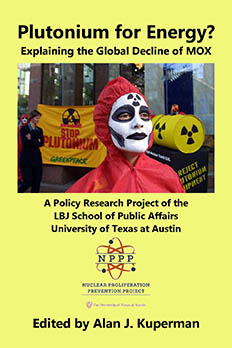Book Chapter
Plutonium for Energy? Explaining the Global Decline of MOX

The root of the moral hazard problem is that genocide — and related human rights violations — often result from state retaliation against a domestic group for rebellion by some of its members. Humanitarian intervention, such as that envisioned under the Responsibility to Protect (R2P), protects some civilians but also commonly facilitates rebellion by suppressing government forces and protecting rebels. The first reform of the R2P is the most important: do not intervene on humanitarian grounds in ways that benefit rebels unless the state has targeted civilians. Second, purely humanitarian relief aid should be delivered in ways that avoid prolonging violence. Third, the international community should preventively deploy resources to persuade states to appease non-violent domestic protest groups. Fourth, potential interveners should not coerce any foreign government to surrender power until they take three precautions against a violent backlash threatening civilians. Finally, interveners should avoid falsely claiming humanitarian motives when they are driven by other aims.
Research Topic
Nuclear Nonproliferation

